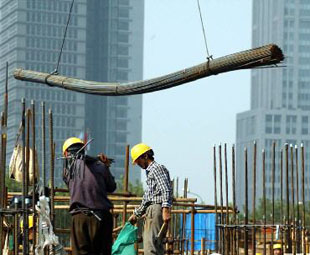The State Council on Wednesday issued a circular calling for tightener supervision over new construction to curb fixed asset investment.
The circular was issued out of concern that continued surging fixed asset growth could push the economy from rapid growth into overheating.
"Violation of laws, shortcomings in law enforcement and the loose supervision of new construction projects caused over-investment and repeated construction in recent years," said the circular.
Investment in construction, factories and other urban fixed assets rose 26.9 percent year-on-year to 8.9 trillion yuan (1.2 trillion U.S. dollars) in the first ten months of 2007, the National Bureau of Statistics (NBS) said last Friday.
New construction projects should pass an array of examination, approval and recording procedures, the circular said. Projects should also comply with industrial policies, development plans, land use regulations and market entry standards, according to the circular.
Departments at all levels that are involved with economic planning, land resources management, environmental protection, construction and statistics must undertake "unified scrutiny" of new projects, report to higher-level authorities and publicize progress of the projects on a regular basis.
They must also "strengthen supervision during and after construction and raise work effectiveness and service awareness", the circular said.
The first ten months saw ground-breaking on 191,086 new projects, up 22,518 from a year earlier. Planned investment in these new projects was 6.67 trillion yuan, up 26.5 percent.
"The government increased the cost of investment to discourage the start of new projects," said Song Guoqing, a researcher with Peking University. However, Song said, higher interest rates "put small and medium-sized private enterprises under considerable pressure, but had little effect on large state-owned firms."
The central bank has raised the benchmark one-year lending rate on five occasions this year, to 7.29 percent at present. The government has also raised the commercial bank reserve ratio on nine occasions, issued bonds to absorb cash and loosened controls on capital outflows.
A cursory glance at official statistics shows that energy-intensive primary industries (farming, fishing, forestry and the like) and the property sector remained the major driver of fixed asset investment growth. Local governments outpaced the central government in approving new construction projects.
During the Jan.-Oct. period, a total of 107 billion yuan went into primary industry, up 39.9 percent year-on-year. Investment in real estate was 1.92 trillion yuan, up 31.4 percent.
Investment approved by the central government was 883 billion yuan, up 13.8 percent, while that approved by local governments was 8.01 trillion yuan, up 28.6 percent.
"This (the circular) shows the central government's determination to push forward tightening measures," said Yao Jingyuan, chief economist with the NBS, "The government has realized it is more important to reduce new projects, especially those that consume too much energy and cause pollution, rather than sticking to credit limits,"
Zhu Zhixin, vice-minister of the National Development and Reform Commission (NDRC), has warned that the risk of overheating persists. Zhu has also said that containing inflation should be a macroeconomic priority.
The NBS said earlier last week that inflation, as measured by the consumer price index, was 6.5 percent year-on-year in October.
Zhang Hanya, Director of the Research Institute of Investment with the NDRC, said that increased real estate spending was a major reason why fixed asset investment had grown.
"Although sales slipped in October compared with the previous two months, they rose by more than 20 percent from a year earlier, "said Zhang Yue, an analyst with Beijing Homelink Real Estate Agency Co., Ltd.
Robust demand, tight supply and higher land development costs drove up housing prices in 70 major mainland cities by 9.5 percent year-on-year in October despite government efforts to curb surging property prices.
"Overall economic growth is stable and fixed asset investment growth is within market expectations," the NDRC's Zhang said.
(Xinhua News Agency November 22, 2007)


